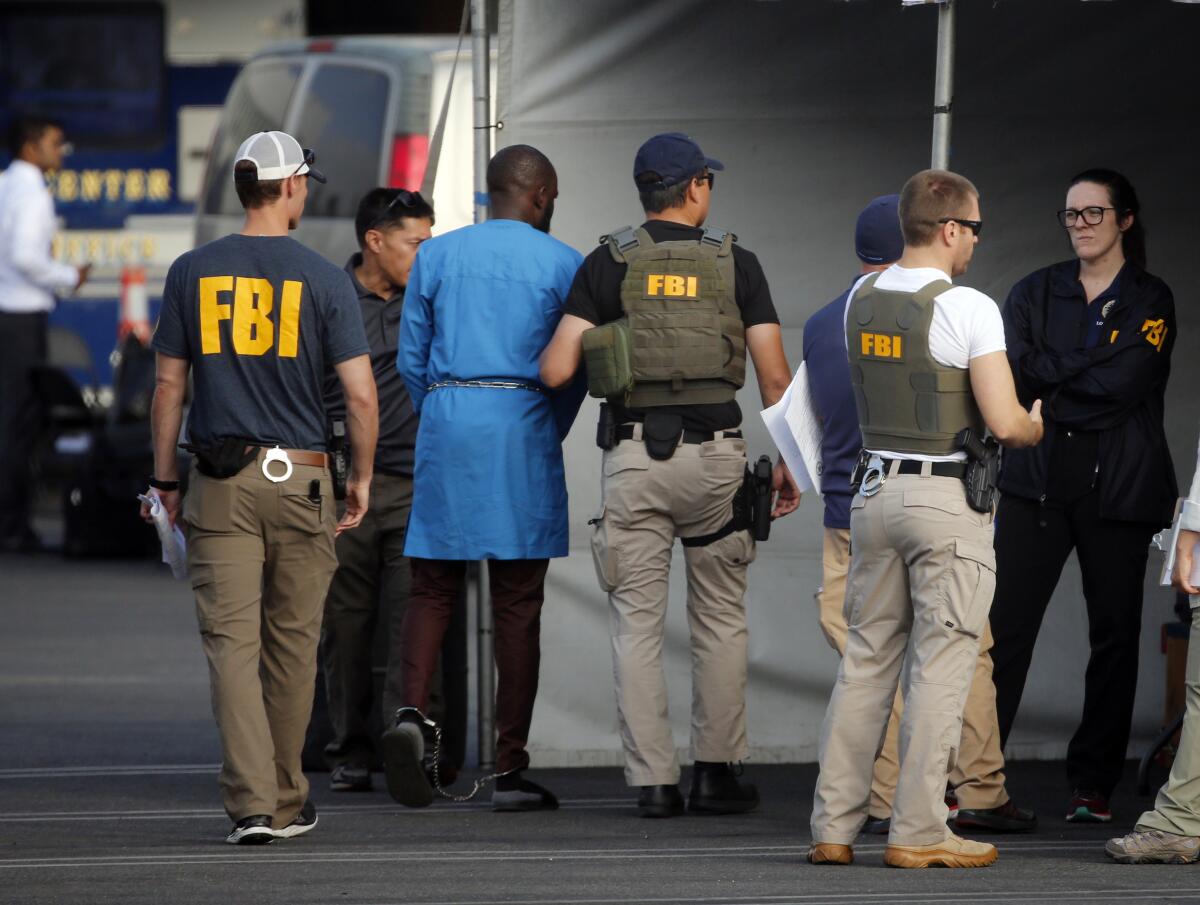FBI takes down alleged Nigerian fraudsters in $46-million case based in Los Angeles

- Share via
The relationship between a Japanese woman and a U.S. Army captain stationed in Syria started online, through an international social network for digital pen pals. It grew into an internet romance over 10 months of daily emails.
It ended with the woman $200,000 poorer and on the verge of bankruptcy after borrowing money from her sister, ex-husband and friends to help Capt. Terry Garcia with his plan to smuggle diamonds out of Syria.
For the record:
5:28 p.m. Aug. 23, 2019A previous version of this article said the suspects are accused of stealing at least $46 million. The alleged thefts totaled $6 million, and authorities say the suspects attempted to steal an additional $40 million.
In reality, there were no diamonds and there was no Garcia: They were part of an elaborate scam hatched by an international ring of cyber thieves operating mainly out of Los Angeles and Nigeria.
Federal authorities cited the case of the Japanese woman, known only as “F.K.” in court papers, on Thursday when they announced an indictment charging 80 people with stealing $6 million and attempting to steal an additional $40 million through various schemes that targeted businesses, the elderly and anyone susceptible to a romance scam. Most of the defendants are Nigerians.
“We believe this is one of the largest cases of its kind in U.S. history,” U.S. Atty. Nick Hanna told a news conference. “We are taking a major step to disrupt these criminal networks.”
The investigation began in 2016 with a single bank account and one victim, said Paul Delacourt, assistant director in charge of the FBI’s Los Angeles office. It grew to encompass victims who were targeted in the U.S. and around the world, some of whom, like the Japanese woman, lost hundreds of thousands of dollars.
“F.K. was and is extremely depressed and angry about these losses,” the federal complaint states. “She began crying when discussing the way that these losses have affected her.”
Her relationship began innocently in March 2016 with an email, but soon “Garcia” made “romantic overtures,” according to federal authorities. He told her they couldn’t talk by phone because he wasn’t allowed to use one in Syria.
So a stream of emails went back and forth, with her using Google to translate his English into her Japanese. A month into the relationship, Garcia told her he’d found a bag of diamonds in Syria and he began introducing her to his associates, starting with a Red Cross representative who told her Garcia had been injured but had given him the box.
F.K. ultimately made 35 to 40 payments, receiving as many as 10 to 15 emails a day directing her to send money to accounts in the U.S., Turkey and the United Kingdom through the captain’s many purported associates.
The fraudsters even threatened her with arrest if she did not continue to pay, and at one point she traveled to Los Angeles because she was told a Russian bank manager had embezzled more than $33,000 of her funds.
Authorities arrested 14 defendants Thursday, mostly in the Los Angeles area. FBI agents could be seen processing suspects in a downtown Los Angeles parking lot before they were arraigned in federal court. It was not immediately known if they had attorneys who could speak on their behalf.
Two suspects were previously in custody and a few others were arrested earlier this week. Hanna said he hoped to be able to work with foreign governments to extradite the remaining defendants.
They all face charges of conspiracy to commit fraud, conspiracy to launder money and aggravated identity theft, and some are charged with additional offenses for alleged fraud and money laundering.
More to Read
Sign up for Essential California
The most important California stories and recommendations in your inbox every morning.
You may occasionally receive promotional content from the Los Angeles Times.










